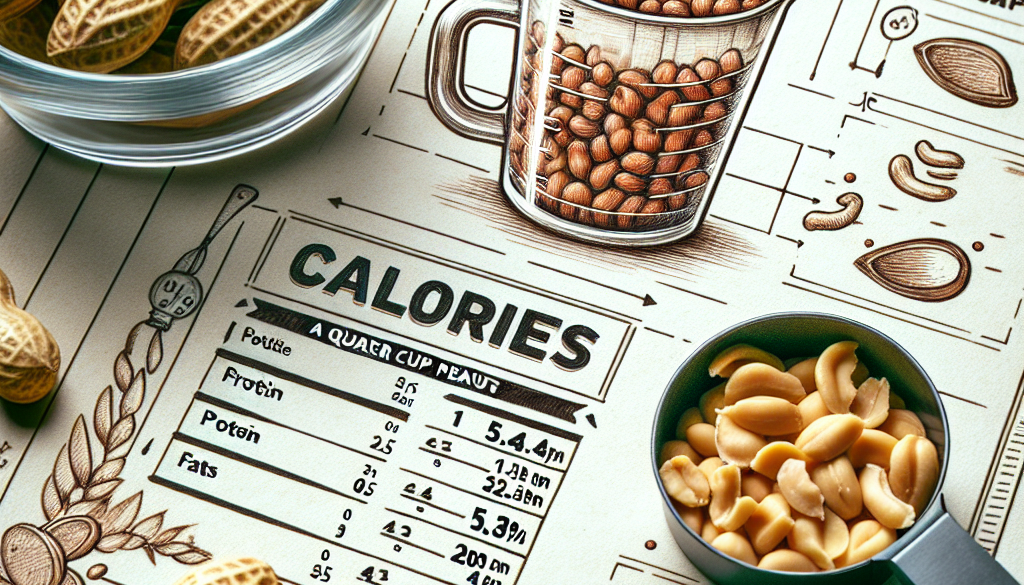How Many Calories in 1/4 Cup Peanuts: Quarter Quest for Nutrition
-
Table of Contents
- Caloric Content of Peanuts: A Quarter Cup Nutritional Exploration
- Understanding Calorie Content in Peanuts
- Caloric Breakdown of 1/4 Cup of Peanuts
- Nutritional Profile of Peanuts
- Macronutrients in Peanuts
- Vitamins and Minerals in Peanuts
- Health Benefits of Peanuts
- Considerations for Including Peanuts in Your Diet
- Portion Control and Mindful Eating
- Conclusion: Peanuts as a Nutrient-Dense Snack
- Discover ETprotein’s High-Quality Protein Products
Caloric Content of Peanuts: A Quarter Cup Nutritional Exploration

Peanuts, a staple in many diets around the world, are not only delicious but also packed with nutrients. They are a source of healthy fats, protein, and various vitamins and minerals. However, when it comes to calorie counting and portion control, understanding the caloric content of peanuts is essential. In this article, we delve into the specifics of how many calories are in a 1/4 cup of peanuts and explore the nutritional benefits they offer.
Understanding Calorie Content in Peanuts
Calories are a measure of energy, and they are crucial in managing body weight and maintaining overall health. Peanuts, being energy-dense foods, contain a significant amount of calories even in small quantities. To understand the impact of consuming 1/4 cup of peanuts, it’s important to break down their caloric content.
Caloric Breakdown of 1/4 Cup of Peanuts
A 1/4 cup of peanuts, which is approximately 36 grams, typically contains about 207 calories. This number can vary slightly depending on the type of peanuts (raw, roasted, salted, etc.) and their preparation method. Here’s a general breakdown of the calories found in different types of peanuts per 1/4 cup:
- Raw peanuts: Approximately 207 calories
- Dry-roasted peanuts: Approximately 214 calories
- Oil-roasted peanuts: Approximately 222 calories
It’s important to note that these values are averages and can vary based on the brand and specific processing methods used.
Nutritional Profile of Peanuts
While calorie content is a key factor for those monitoring their energy intake, the nutritional value of peanuts goes beyond just calories. Peanuts are a rich source of nutrients that contribute to a healthy diet.
Macronutrients in Peanuts
Peanuts are composed of a balance of macronutrients that provide sustained energy and support various bodily functions:
- Protein: A 1/4 cup serving of peanuts contains about 9.5 grams of protein, making them a great plant-based protein source.
- Fats: Peanuts are high in monounsaturated and polyunsaturated fats, which are heart-healthy fats. They contain about 18 grams of fat per serving, with only about 2.5 grams being saturated fat.
- Carbohydrates: Peanuts have a low carbohydrate content, with about 6 grams per serving, which includes about 2.3 grams of dietary fiber.
Vitamins and Minerals in Peanuts
Peanuts are also a treasure trove of vitamins and minerals, including:
- Vitamin E: An antioxidant that helps protect cells from damage.
- Magnesium: Important for bone health and energy production.
- Phosphorus: Assists in the formation of bones and teeth.
- Zinc: Crucial for immune function and wound healing.
- Niacin: Supports metabolism and nervous system health.
Health Benefits of Peanuts
Regular consumption of peanuts, in moderation, can offer several health benefits:
- Heart Health: The monounsaturated and polyunsaturated fats in peanuts can help lower bad cholesterol levels, reducing the risk of heart disease.
- Weight Management: Peanuts have a high satiety value, which can help control hunger and, in turn, aid in weight management.
- Diabetes Control: The low glycemic index of peanuts makes them a good snack for people with diabetes, helping to maintain blood sugar levels.
- Reduced Risk of Gallstones: Studies have shown that regular peanut consumption may reduce the risk of gallstone formation.
Considerations for Including Peanuts in Your Diet
While peanuts are nutritious, they are also calorie-dense, so portion control is key. A 1/4 cup serving can be a healthy addition to your diet, but it’s important to account for the calories and fats if you’re monitoring your intake for weight management or health reasons.
Portion Control and Mindful Eating
Here are some tips for incorporating peanuts into your diet without overindulging:
- Measure your servings to avoid mindless snacking.
- Choose unsalted or lightly salted peanuts to reduce sodium intake.
- Opt for raw or dry-roasted peanuts over oil-roasted to minimize added fats.
Conclusion: Peanuts as a Nutrient-Dense Snack
In conclusion, a 1/4 cup of peanuts contains about 207 calories, along with a rich profile of nutrients that can offer various health benefits. When consumed in moderation, peanuts can be a valuable addition to a balanced diet. Remember to consider the type of peanuts and preparation methods to ensure you’re making the healthiest choice for your nutritional needs.
Discover ETprotein’s High-Quality Protein Products
If you’re looking to enhance your diet with additional protein sources, consider ETprotein’s range of organic bulk vegan protein and plant proteins. Their products, including peanut protein, are designed to cater to a variety of dietary preferences and are perfect for those seeking non-GMO, allergen-free options.
About ETprotein:
ETprotein, a reputable protein Chinese factory manufacturer and supplier, is renowned for producing, stocking, exporting, and delivering the highest quality organic bulk vegan protein and plant proteins. They include Organic rice protein, clear rice protein, pea protein, clear pea protein, pumpkin seed protein, sunflower seed protein, mung bean protein, peanut protein etc. Their offerings, characterized by a neutral taste, non-GMO, allergen-free attributes, cater to a diverse range of industries. They serve nutraceutical, pharmaceutical, cosmeceutical, veterinary, as well as food and beverage finished product distributors, traders, and manufacturers across Europe, USA, Canada, Australia, Thailand, Japan, Korea, Brazil, and Chile, among others.
ETprotein specialization includes exporting and delivering tailor-made protein powder and finished nutritional supplements. Their extensive product range covers sectors like Food and Beverage, Sports Nutrition, Weight Management, Dietary Supplements, Health and Wellness Products, and Infant Formula, ensuring comprehensive solutions to meet all your protein needs.
As a trusted company by leading global food and beverage brands and Fortune 500 companies, ETprotein reinforces China’s reputation in the global arena. For more information or to sample their products, please contact them and email sales(at)ETprotein.com today.












